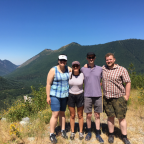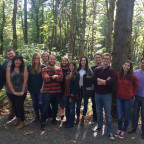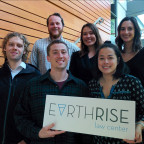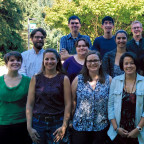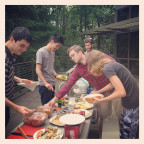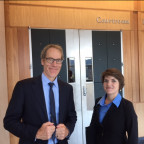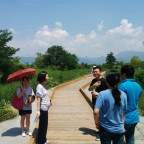Education
-
Preparing tomorrow’s advocates to defend our natural heritage
Earthrise Law Center maximizes its impact through the work of talented and committed law students. While Earthrise’s staff attorneys retain ultimate responsibility for case prosecution, students play a vital role at Earthrise by participating in all phases of the clinic’s work. Students draft pleadings and motions, formulate arguments and strategy, and participate in client contacts.
In addition to receiving invaluable hands-on experience, students earn law school credit for their work with Earthrise. The environmental clinic class supplements student casework by providing additional instruction on the practice of environmental law. The class meets once per week. Class topics include informal discussions about current projects, lectures on aspects of environmental practice, and contact with local practitioners.
The environmental community reaps benefits from increasing the pool of law school graduates with substantial real-world experience and training. Earthrise students and externs are tomorrow’s advocates for our natural heritage. Many Earthrise alums now lead the charge in working to preserve and protect the environment as attorneys in public interest, government, and private practice.
The Earthrise Student Experience
Earthrise Law Center provides two opportunities for rising 2L, 3L and LLM Lewis & Clark Law students: the academic year clinic and the summer clerkship.
The Earthrise Clinic
Earthrise Law Center offers a 3 credit per semester clinic during the fall and spring semesters. Students enrolled in the clinic during the school year work on actual environmental cases under the supervision of Earthrise’s three clinical professors. Students are assigned to work on a variety of cases across a broad spectrum of environmental issues utilizing statutes such as the Clean Water Act, the National Environmental Policy Act, and the Endangered Species Act. They delve into the details of a case, present the facts to the class and collaboratively devise winning strategies. The matters on the docket provide students with the opportunity to work on litigation on in depth, complex, and environmentally important lawsuits. Students will interact directly with clients and make connections that will benefit their future careers. The clinic represents an array of environmental organizations seeking to prevent or reduce pollution and protect wildlife, habitat, and ecosystems.
The close one-on-one and small group relationships fostered by our 1:3 or 4 faculty-to-student ratio encourages strong student development in fundamental lawyering skills, including:
- Problem Solving
- Legal Analysis and Reasoning
- Communication
- Legal Research
- Factual Investigation
- Organization and Management of Legal Work
- Litigation Strategy
Each week, students are expected to attend and participate in a 2-hour classroom component, meet with a supervising attorney, as well as work 10 hours outside of class on average each week on cases as assigned. Grading is currently on a pass/no pass basis, but Earthrise may adopt the grading system currently used for externships. Class attendance is mandatory. Depending on the work in the clinic, there is a possibility that a WIE paper can be completed. Prior professor permission and consent is needed. Talk to an Earthrise professor for more information. Students who enroll in Earthrise also are eligible to take Earthrise Ethics, a two-semester, one credit per semester course that satisfies the Professional Responsibility graduation requirement.
Unlike an externship, enrolling in the clinic fulfills a student’s “highly specialized” requirement and professional responsibility credits, if they take Earthrise Ethics.
To learn about How to Enroll in the Earthrise Clinic, click here.
To learn about Earthrise’s Tomorrow’s Advocates Summer Clerkship program, click here.
Summer Interns at Earthrise
Rising Issues #18
Welcome Earthrise Class of 2017-2018!
From Our First Summer Clerk in San Francisco
Craig Johnston Steps Down as Director of Earthrise
Professor Craig Johnston has stepped down as director of Earthrise law center, passing on the role to attorneys Allison LaPlante and Tom Buchele. As one of the original founders of the clinic, Craig’s leadership has been a great benefit to Lewis & Clark law school, the students, and the planet.
Introducing Earthrise’s 2017 Summer Clerks
Earthrise Legal Fellow Says Farewell
“Around the Pier” with Samantha Murray
Earthrise Clinic Now Accepting Applications for Fall 2017
It’s time to apply to be a part of the Earthrise Clinic for the 2017-18 School Year! Deadline is March 24th.
Summer Clerkship Applications Now Being Accepted
Meet the 2016-2017 Earthrise Class
Summer Extern Chillemi Joins Attorney Rohlf at the Table for Oral Argument on Cormorant Culling on the Columbia River
Earthrise Summer Extern Scores Clerkship with her Writing Skills
Travel Log Part 2: Dan Rohlf Teaches Environmental Law in South Korea for the Summer
For Fly-Fisher Mark Tuai, Environmentalism and Sport Inextricably Intertwined
Mark Tuai gains real world experience being around a team of extraordinary attorneys dedicated to improving the environment.
Earthrise Law Center is located in Wood Hall on the Law Campus.
MSC: 51
email earthrise@lclark.edu
voice (503) 768-6736
fax (503) 768-6642
Allison LaPlante
Earthrise Law Center
Lewis & Clark Law School
10101 S. Terwilliger Boulevard MSC 51
Portland OR 97219
